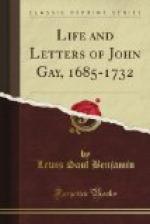With all his unworldliness Gay always had an eager, if not very keen, eye on the main chance, and finding himself surrounded by men of influence, he not unnaturally, in a day when men of letters often found their reward in Government places or in sinecures, looked to his acquaintances to further his interests. Great Britain was at this time represented at the Court of Hanover by a Mission which was from 1709 in charge of the Secretary, J. D’Alais, except when Special Missions were dispatched. Lord Rivers was Minister Plenipotentiary in 1710, and Thomas Harley went there as Ambassador Extraordinary in July, 1712, and again in the following February. Henry Paget, first Lord Burton, was appointed Ambassador in April, 1714, but resigned before he set forth, and Lord Clarendon was nominated in his stead.
JOHN GAY TO DEAN SWIFT.
London, June 8th, 1714.
“Since you went out of town, my Lord Clarendon was appointed Envoy-Extraordinary to Hanover in the room of Mr. Paget, and by making use of those friends, which I entirely owe to you, he has accepted me for his Secretary. This day, by appointment, I met his Lordship at Mr. Secretary Bromley’s office; he then ordered me to be ready by Saturday. I am quite off from the Duchess of Monmouth. Mr. Lewis was very ready to serve me upon this occasion, as were Dr. Arbuthnot and Mr. Ford. I am every day attending my Lord Treasurer [Oxford] for his bounty, in order to set me out, which he has promised me upon the following petition, which I sent him by Dr. Arbuthnot:—
I’m no more to converse with the
swains,
But go where fine folk
resort:
One can live without money on plains.
But never without it
at Court.
If, when with the swains I did gambol,
I array’d me in
silver and blue:
When abroad, and in Courts, I shall ramble,
Pray, my Lord, how much
money will do?
We had the honour of the Treasurer’s company last Saturday, when we sat upon Scriblerus. Pope is in town and has brought with him the first book of Homer. I am this evening to be at Mr. Lewis’s with [Dr. Benjamin Pratt] the Provost [of Dublin College], Mr. Ford, Parnell, and Pope.”
“It is thought my Lord Clarendon will make but a short stay at Hanover. If it was possible that any recommendation could be procured to make me more distinguished than ordinary, during my stay at that Court, I should think myself very happy if you could contrive any method to prosecute it, for I am told that their civilities very rarely descend so low as to the Secretary. I have all the reason in the world to acknowledge this as wholly owing to you. And the many favours I have received from you, purely out of your love for doing good, assures me you will not forget me during my absence. As for myself, whether I am at home or abroad, gratitude will always put me in mind of the man to whom I owe so many benefits."[7]




